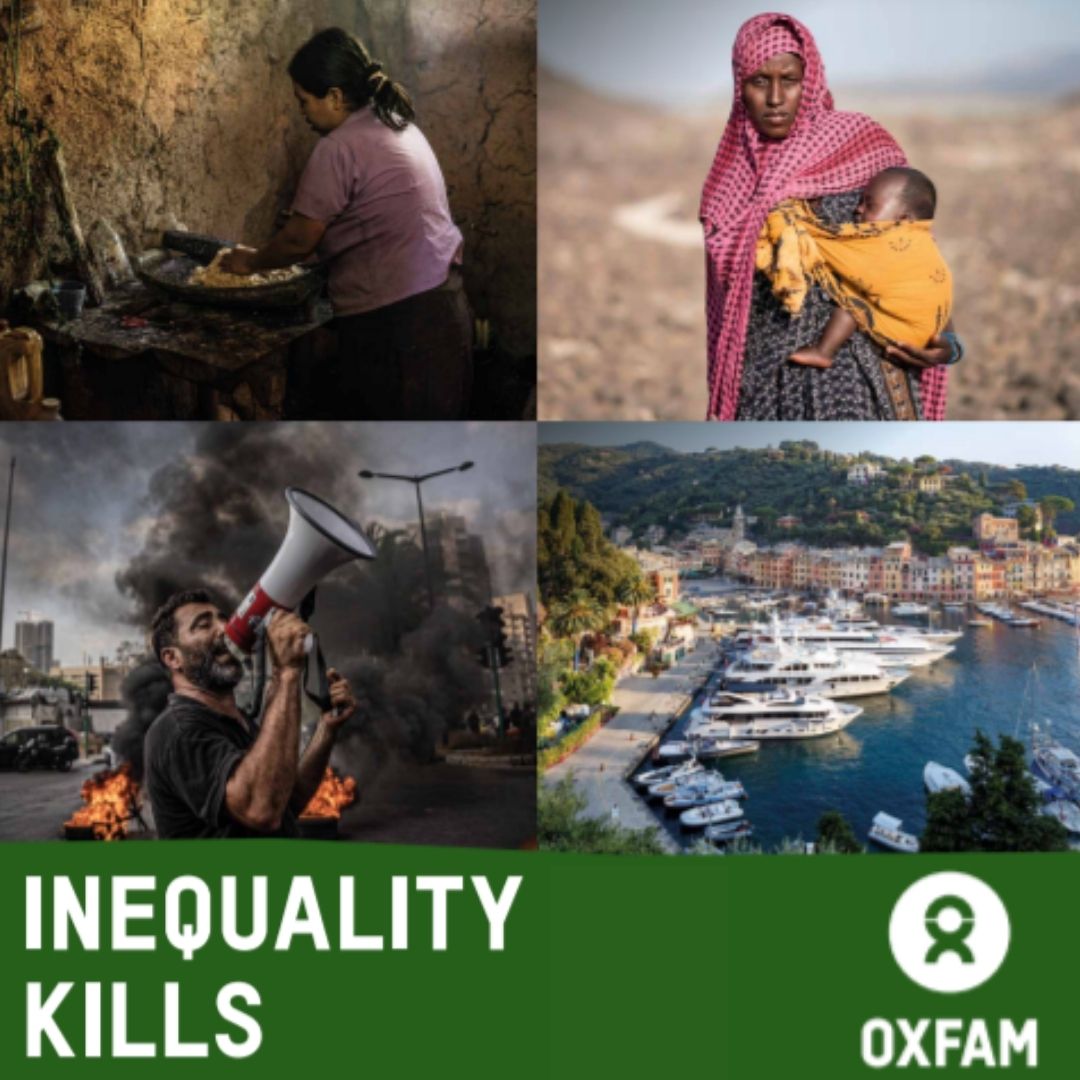
Image Credit: Oxfam
Inequality Kills: A Report By Oxfam International Which Talks About The Inequality Across The World
Writer: Anwesha Singh
She is a trainee journalist at Indian Institute of Journalism and New Media in Print stream. She has graduated from Home Science with specialization in Development Communication and Extension from Lady Irwin College, Delhi University. She likes reporting, writing, copyediting amongst others.
Others/World, 17 Jan 2022 12:04 PM GMT
Editor : Shiva Chaudhary |
A post-graduate in Journalism and Mass Communication with relevant skills, specialising in content editing & writing. I believe in the precise dissemination of information based on facts to the public.
Creatives : Shiva Chaudhary
A post-graduate in Journalism and Mass Communication with relevant skills, specialising in content editing & writing. I believe in the precise dissemination of information based on facts to the public.
Ahead of the World Economic Forum's Davos Agenda, Oxfam International has released a report titled Inequality Kills which talks about how the wealth is accumulated among few persons and the rest of the people live under distress and poverty.
The latest press release by Oxfam International on January 17, 2022, states that since the COVID-19 pandemic, the world's ten richest men have doubled their fortunes while incomes of 99 per cent of humanity fell.
According to the press release, the world's ten richest men have more than doubled their wealth from $700 billion to $1.5 trillion, which is at a rate of $15,000 per second or $1.3 billion per day in the first two years of the pandemic. However, more than 160 million people were pushed into poverty during this time.
Gabriela Bucher, Oxfam International's Executive Director, had said, "If these ten men were to lose 99.999 per cent of their wealth tomorrow, they would still be richer than 99 per cent of all the people on this planet. They now have six times more wealth than the poorest 3.1 billion people."
Oxfam International has published its report 'Inequality Kills' ahead of the World Economic Forum's Davos Agenda. Oxfam says that inequality contributes to the death of at least 21,000 people each day, or one person every four seconds.
What Does The Report Say?
The report talks about inequality spread all over the world. In a shocking revelation, 252 men have more wealth than all 1 billion women and girls of nations like Africa, Latin America and the Caribbean when combined. The top 1% have captured nearly 20 times more of global wealth than the bottom 50% of humanity since 1995. If the life expectancy of Black Americans were the same as White people, then 3.4 million Black Americans would have been alive today, and it was already 2.1 million before COVID-19. Talking about the harm done to the environment, 20 of the wealthiest billionaires emit 8000 times more carbon than the poorest 1 billion.
Institutions like International Monetary Fund (IMF), World Bank, Credit Suisse and the World Economic Forum have projected that pandemic has triggered a spike in inequality within nations worldwide. As in Bangladesh, people were five times more susceptible to death because of COVID-19 than the White British population in England during the second wave.
Inequality As A Form Of Economic Violence
The effect of inequality is that it directly harms the vast majority of ordinary people worldwide. The people in poverty, women and girls, and radicalised groups are disproportionately killed or hurt, more than wealthy and privileged.
The report estimates that 5.6 million people die every year due to lack of access to healthcare in poor nations, and 2.1 million people die every year due to hunger. At least 67,000 women lose their lives every year due to female genital mutilation or murder at the hands of their partners. The climate crisis would also affect poor nations, and by 2030, it could kill 231,000 people every year in poor countries.
What Does The Report Say About India?
The report discussed India's governance structures that promote wealth accumulation by a few and fail to provide safety nets to the rest of the population.
As per the report, the number of Indian billionaires grew to 142 in 2021 from 102 in 2020. It was when the share of the bottom 50 per cent of the population in national wealth was just 6 per cent. And India's top 10 per cent had around 45 per cent of the country's total national wealth in 2020.
The report also talks about how imposing tax on the rich in India can take care of vital public services like health and education. Likewise, imposing a 4 per cent tax on 98 wealthiest families in the country can look after the Ministry of Health and Family Welfare for more than two years, the Mid-Day Meal Programme for 17 years or the Samagra Shiksha Abhiyan for six years. Similarly, the Ayushman Bharat Scheme can be financed for more than seven years or the Department of School Education and Literacy of Government of India if 1 per cent wealth tax is imposed on 98 most affluent billionaire families in India.
The report also revealed that one-third of respondents with a ration was were not able to buy ration at a PDS outlet.
Recommendations Of Oxfam India
To tackle the growing inequality, Oxfam India believes an immediate requirement to start disaggregating more public statistics by income and introduce a regular collection of data on income and wealth inequality. India's wealth from the super-rich should be redistributed to generate sources for the majority, and revenue should be generated to invest in the education and health of future generations.
Also Read: India Open 2022: India's Lakshya Sen Defeats Loh Kean Yew To Win Final
 All section
All section













